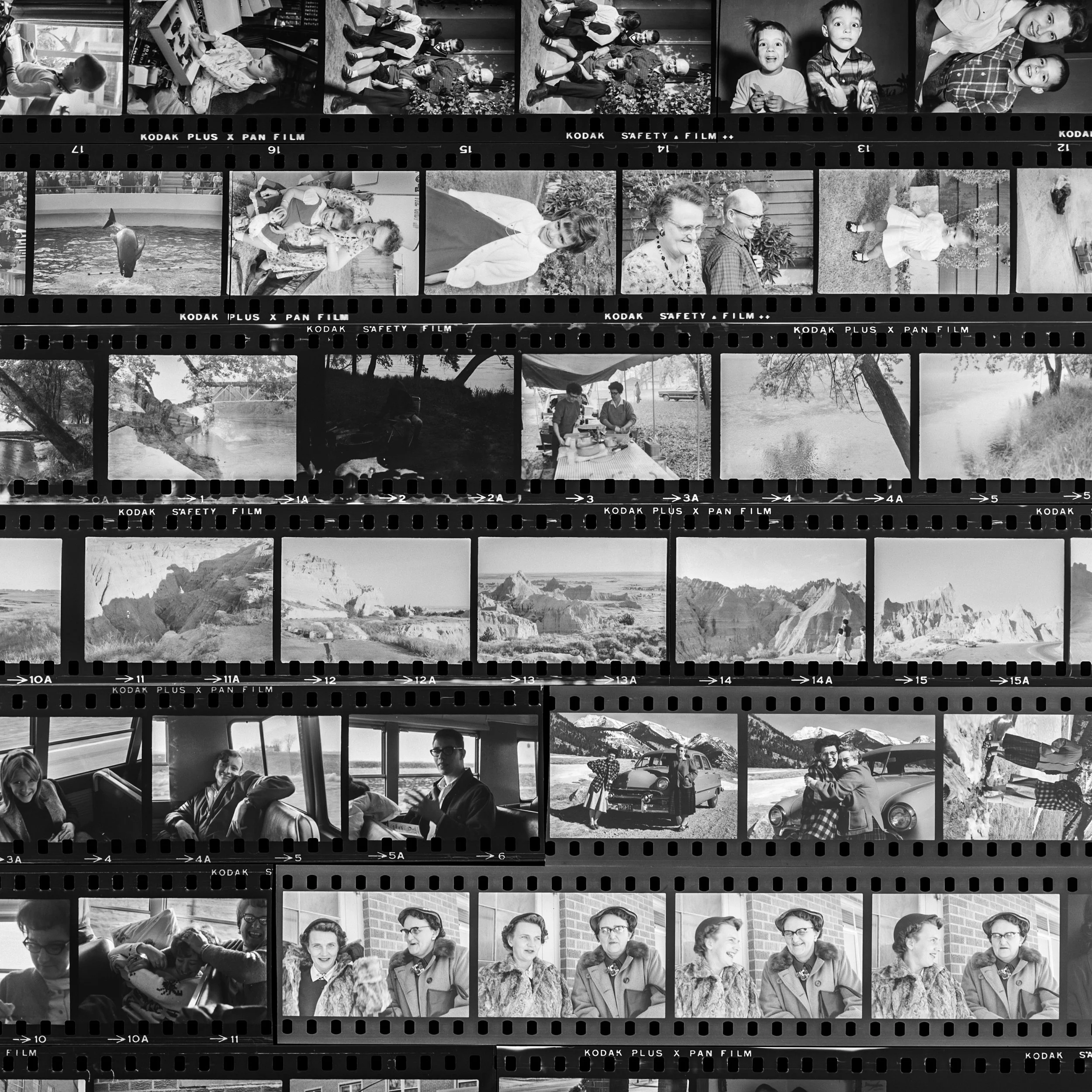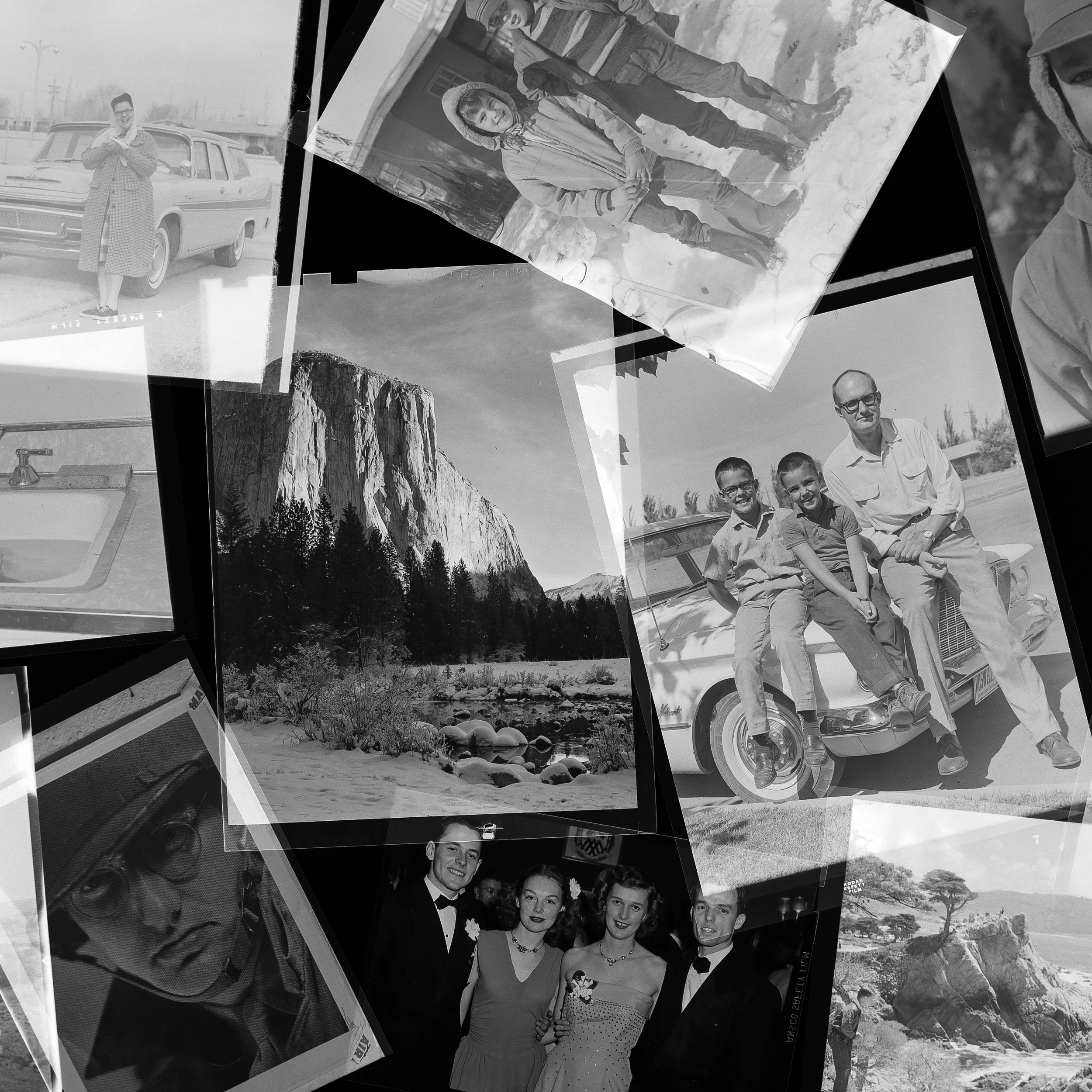SERVICES
Quite simply, The Film Preservation Project digitizes your film negatives and slides.
We commonly digitize the formats listed below. If you do not see your format(s) listed, or you don't know what format(s) you have, please drop me a line and get in touch!
35mm film (Color negative, black and white, Unmounted slide film)
35mm film is probably the most common thing we have hiding in boxes in our basements and closets. It is easily distinguishable by rows of sprocket holes on both sides of the film strip. The standard full 35mm frame is 24 x 36mm, but other frame sizes have been created over the years, including half frame, "Widelux," and "X-Pan." With any frame size, the height of the frame remains 24mm, while the width of the frame varies. "Widelux" and "X-Pan" widths are not common.
Regular Sizes:
Full Frame (the standard 35mm frame) Scanned Image Dimensions: 3024 x 2005 pixels
Half Frame Scanned Image Dimensions: 1414 x 2005 pixels
$0.34 per frame
Large Sizes:
Full Frame (the standard 35mm frame) Scanned Image Dimensions: 6048 x 4011 pixels
Half Frame Scanned Image Dimensions: 2828 x 4011 pixels
"Widelux" Scanned Image Dimensions: 9790 x 4011 pixels
"X-Pan" Scanned Image Dimensions: 10980 x 4011 pixels
$0.50 per frame
35mm mounted slides
35mm mounted slides are single frames of 35mm positive film mounted between two pieces of thick paperboard or plastic. Think: the iconic Kodachrome slide.
Scanned Image Dimensions: 4200 x 2800 pixels*
$0.50 per slide**
* Depending upon the size of the mount, some images final dimensions may be slightly larger or slightly smaller.
** Individual slides can be unmounted and scanned to achieve image dimensions of 6048 x 4011 pixels for $1.10 per slide. This is not recommended, as the slide mount will be damaged, but is excellent if you want a really large file!
120/220/620/616 film - Medium format
120, 220, and 620 films are commonly given the designation of "medium format." Medium format film does not have sprocket or registration holes like 35mm, 110, and 126 films do. All are approximately 6cm wide and vary by length and the size and shape of the spool on which they were originally wound. Actual image size is typically 56mm wide with a variable length depending upon the camera used to capture the image. Common sizes of medium format images are 6x4.5, 6x6, 6x7, 6x8, and 6x9. Less common are 6x12, 6x17, and 6x24. The "6" in each of these sizes refers to the width of the film of ~6cm, while the width is denoted by the other number in the name.
We offer two different scanned heights. Scan widths vary by the size of the frame.
Scanned Image Dimensions: 5025 pixels along the film width edge.* For example: a 6x6 frame from a Rolleiflex (pictured) comes out at roughly 5025 x 5025 pixels, while a 6x7 frame will come in at roughly 5025 x 6200 pixels.
$1.00 per frame
Scanned Image Dimensions: 7200 pixels along the film width edge.* For example: a 6x6 frame from a Rolleiflex (pictured) comes out at roughly 7200 x 7200 pixels, while a 6x7 frame will come in at roughly 7200 x 8850 pixels.
$1.50 per frame
For most people, the 5025 pixel size is large enough and provides plenty of resolution. The 7200 pixel size is recommended for those who wish to make extremely large prints or crop and print small sections of an image.
* These dimensions can vary slightly depending upon the image size originally captured on the negative itself.
127 film and slides
127 film is 46mm wide. 127 film is similar to medium format film in that the film is not perforated. Most 127 images are square in format.
We offer two different scanned heights. Scan widths vary by the size of the frame.
Scanned Image Dimensions: 3600 pixels along the film width edge.* For example: a 4x4 frame from a Baby Rolleiflex (pictured) comes out at roughly 3600 x 3600 pixels.
$0.75 per frame
Scanned Image Dimensions: 5200 pixels along the film width edge.* For example: a 6x6 frame from a Rolleiflex (pictured) comes out at roughly 5200 x 5200 pixels.
$1.25 per frame
* These dimensions can vary slightly depending upon the image size originally captured on the negative itself.
126 instamatic film and slides
126 "Instamatic" was a very popular film format first introduced in 1963. 126 film has the same width as 35mm film, but with a 28x28mm square image format. It is easily recognizable by this square image size and a line of registration holes along one edge of the film. Most 126 film cameras were simple and captured low quality images compared to 35mm film. We offer two sizes of 126 scans:
Scanned Image Dimensions: 2500 x 2500 pixels*
$0.50 per frame
Scanned Image Dimensions: 3600 x 3600 pixels*
$0.90 per frame
* These dimensions can vary slightly depending upon the image size originally captured on the negative itself.
110 instamatic
110 Instamatic film was introduced in 1972. 110 film is 16mm wide with a teeny tiny image size of 13 x 17mm. Most 110 film cameras were simple and captured low quality images compared to 35mm and even 126 film. We offer one size of 110 scans:
Scanned Image Dimensions: 2500 x 1850 pixels*
$0.50 per frame
* These dimensions can vary slightly depending upon the image size originally captured on the negative itself.
large format - 4 x 5", 3.25 x 4.25", etc.
Single sheet large format films can be quite common in the photo collections of previous generations. When well preserved, large format negatives contain an enormous amount of detail, and can be truly stunning when viewed over a light table.
Because image sizes vary, we scan these formats based upon pixels per inch. For example, a 3.25" x 4.25" negative may have an actual image area of 3 x 3.875 inches. At 2300 pixels per inch, an image 3 x 3.875 inches in size will yield an image with scanned dimensions of roughly 6900 x 8900 pixels.
Scanned Image Resolution: approximately 2300 pixels per inch:
$2.50 per frame up to 4" x 5"
Scanned Image Resolution: approximately 4200 pixels per inch:
$5.00 per frame up to 4" x 5"
Additional Services
Advanced Dust, Scratch, and Spot Removal
$5.00 per image
We get rid of most of the big stuff without any additional charge, but more often than not, most negatives and slides will have dust, scratches, and even fungus on them that cannot be removed without some serious work. With this service, scanned images are digitally corrected for dust and scratches down to the smallest of levels to deliver the cleanest image possible. Please note that images derived from heavily damaged film negatives and slides are sometimes too far gone to be "repaired" digitally. We recommend opting for this service on only select images once you receive your scans.
Slide and Negative Sleeving
(price determined by volume)
I personally keep my mounted slides and negatives in three ringed notebooks inside of archival pages. I find this to be an easy way to organize and preserve my film. Should you wish, the Film Preservation Project can organize and sleeve your slides and negatives for you in a similar manner. The cost of doing so can be calculated by request upon receiving your film.








